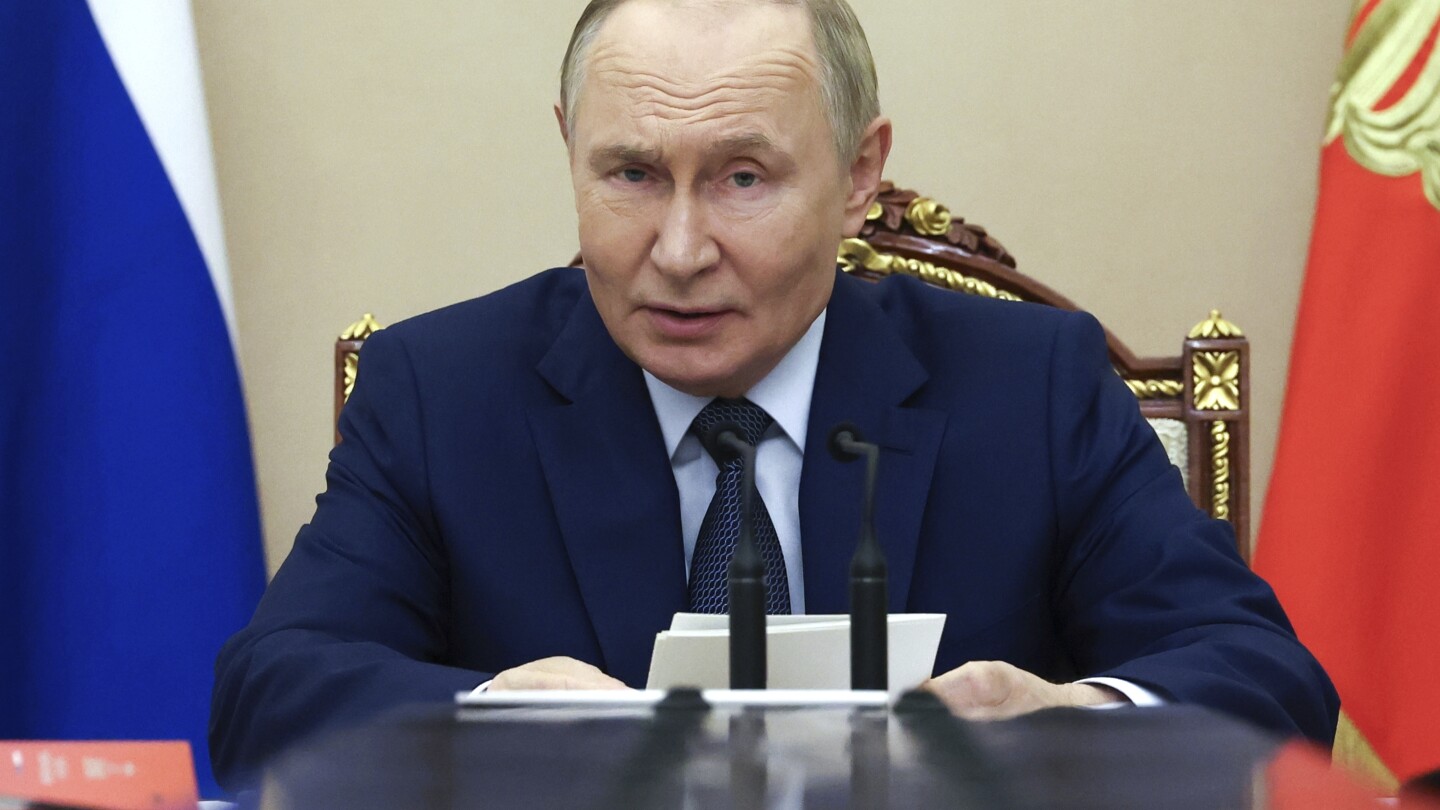MOSCOW (AP) — Russian President Vladimir Putin said Monday that Moscow will adhere to nuclear arms limits for one more year under the last remaining nuclear pact with the United States that expires in February, and he urged Washington to follow suit.
Putin declared that the termination of the 2010 New START would be destabilizing and could fuel proliferation of nuclear weapons.
“To avoid provoking a further strategic arms race and to ensure an acceptable level of predictability and restraint, we believe it is justified to try to maintain the status quo established by the New START Treaty during the current, rather turbulent period,” Putin said in televised remarks. “Therefore, Russia is prepared to keep adhering to the central quantitative limitations of the New START Treaty for one year after Feb. 5, 2026.”
Arms control advocates long have voiced concern about the treaty’s looming expiration and warned that it could fuel a new round of nuclear arms race and increase the risk of a nuclear conflict.
Putin urges the U.S. to reciprocate
Putin noted that “based on our analysis of the situation, we will subsequently make a decision on maintaining these voluntary self-restraints.”
He emphasized that Russia expected the U.S. to follow its example and also stick to the treaty’s limits.
“We believe this measure will only be viable if the United States acts in a similar manner and does not take steps that undermine or disrupt the existing balance of deterrence potentials,” Putin said.
Daryl G. Kimball, the director of the Washington-based Arms Control Association, welcomed Putin’s statement on X as “an important and positive move.”
He and other arms control experts long have prodded Moscow and Washington to quickly reach an interim deal to maintain existing nuclear weapons limits.
“More nuclear weapons will not make anyone safer,” Kimball said in a commentary earlier this month. “By agreeing not to exceed the current strategic nuclear limits, they could reduce tensions, forestall a costly arms race that no one can win, create diplomatic leverage to curb the buildup of China’s arsenal, and buy time for talks on a broader, more durable, treaty.”
U.S. President Donald Trump has said that he and Putin talked about nuclear weapons during their summit in Alaska last month. Asked to comment in July on a looming expiration of the New START, Trump noted “that is a big problem for the world, when you take off nuclear restrictions.”
Putin instructed Russian agencies to “closely monitor relevant American activities, particularly with regard to the strategic offensive arms arsenal,” with a particular emphasis on plans to “expand the strategic components of the U.S. missile defense system, including preparations for the deployment of interceptors in space.”
“The practical implementation of such destabilizing actions could undermine our efforts to maintain the status quo in the strategic offensive arms sphere,” Putin warned, adding that, in that case, “we will respond accordingly.”
He emphasized that Moscow’s honoring the pact’s limits could “make a significant contribution to creating an atmosphere conducive to substantive strategic dialogue with the U.S.,” provided that other efforts are also taken to normalize bilateral relations.
The pivotal pact
The New START, signed by then U.S. President Barack Obama and Russian counterpart Dmitry Medvedev, limits each country to no more than 1,550 deployed nuclear warheads and 700 deployed missiles and bombers. Its looming expiration and the lack of dialogue on anchoring a successor deal have worried arms control advocates.
The pact also envisaged sweeping on-site inspections to verify compliance, but they were halted in 2020 because of the COVID-19 pandemic and never resumed.
In February 2023, Putin suspended Moscow’s participation in the treaty, saying that Russia couldn’t allow U.S. inspections of its nuclear sites at a time when Washington and its NATO allies have openly declared Moscow’s defeat in Ukraine as their goal.
At the same time, Russia has emphasized that it wasn’t withdrawing from the pact altogether and pledged to respect the caps on nuclear weapons set under the treaty and keep notifying the U.S. about test launches of ballistic missiles.
Another U.S.-Russian nuclear arms pact — the 1987 Intermediate-range Nuclear Forces Treaty that banned land-based missiles with a range between 500-5,500 kilometers (310-3,400 miles) — was terminated in 2019.
Putin’s statement comes at a time of heightened tensions between Russia and the West, fueling concerns that fighting could spread beyond Ukraine’s borders as European countries rebuked Russia for what they said were provocations. The incidents have included Russian drones landing on Polish soil and Estonia accusing Russian fighter jets of intruding into its airspace.
___
The Associated Press receives support for nuclear security coverage from the Carnegie Corporation of New York and Outrider Foundation. The AP is solely responsible for all content. ___ Additional AP coverage of the nuclear landscape: https://apnews.com/projects/the-new-nuclear-landscape/

